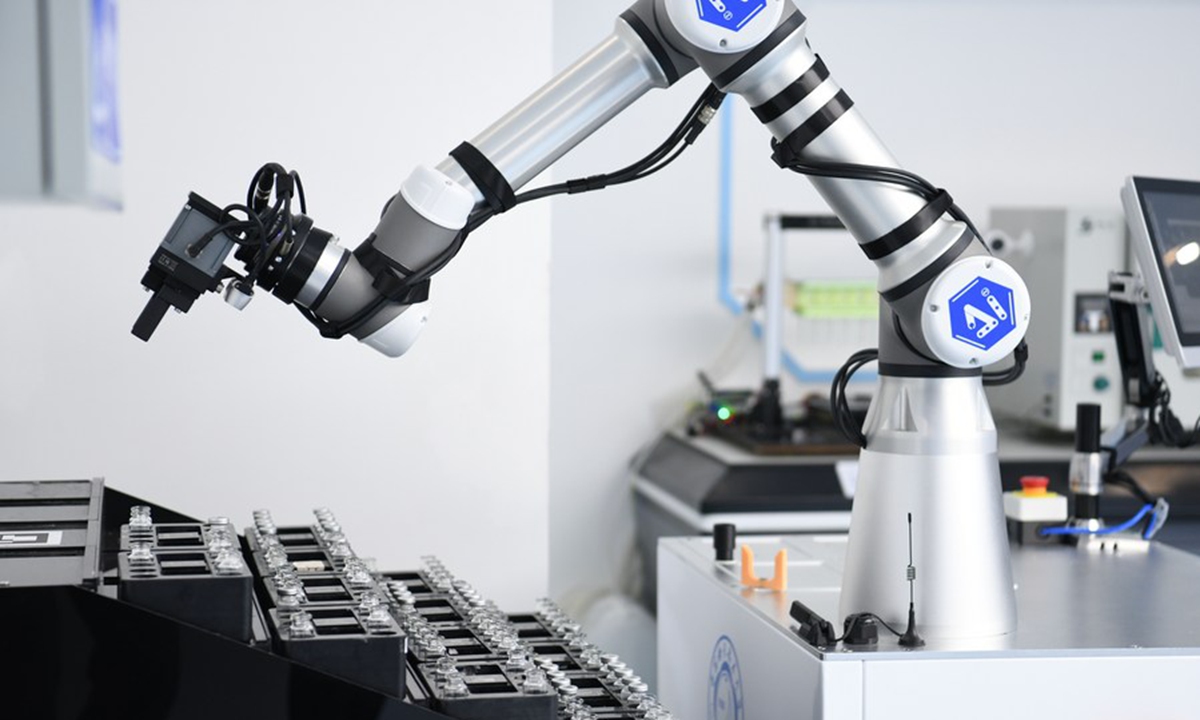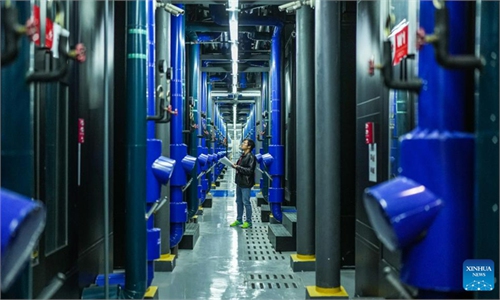
The AI-Chemist system performs a chemical experiment at a laboratory in the University of Science and Technology of China in Hefei, east China's Anhui Province, Oct. 21, 2022. Photo: Xinhua
The first Belt and Road Conference on Science and Technology Exchange started on Monday, and analysts said China will continue to attach importance to international cooperation on innovation exchanges, and let tech advances benefit more countries and people in the world.
Chinese President Xi Jinping sent a congratulatory letter to the conference, which is taking place in Southwest China's Chongqing city from Monday to Tuesday.
Xi noted that the third Belt and Road Forum for International Cooperation was successfully held (in mid-October), ushering in a new stage of high-quality development for the Belt and Road Initiative (BRI), of which sci-tech cooperation is an important part, according to the Xinhua News Agency.
"China is willing to work with other countries to tap the potential for innovative growth, unleash the potential of innovation cooperation, strengthen innovation partnerships, and promote innovation achievements to benefit people from all countries, thereby, making contributions to the high-quality development of the Belt and Road Initiative and the building of a community with a shared future for humankind." President Xi said.
Analysts noted that the conference sends a strong signal that China is a major advocate and practitioner of free trade and the country will continue to contribute Chinese wisdom to global sci-tech advances.
The first Belt and Road Conference on Science and Technology Exchange will showcase more than 80 instances of cooperation in the sci-tech sector. The conference will focus on inter-governmental tech cooperation, people-to-people exchanges, and industrial innovation and development.
This year marks the 10th anniversary of BRI. In the past decade, the mechanism of scientific and tech cooperation has been deepened, exchanges of researchers have been more frequent, and the achievements of scientific and technological cooperation have been increasingly fruitful, Zhang Guangjun, Vice Minister of Science and Technology, said on October 30.
"The BRI made significant attainments over the past 10 years and has greatly aroused the enthusiasm of developing countries to join the initiative. As the high-quality development of the BRI enters a new stage, there are growing expectations among BRI partner countries to increase tech cooperation with China in order to boost their own development in smart manufacturing and the digital economy," Song Wei, a professor at the School of International Relations and Diplomacy at the Beijing Foreign Studies University, told the Global Times on Monday.
China and BRI partner countries should seize the opportunity to jointly find answers to challenges faced by the world, said Song, noting that China's rise in technology and innovation capability is a prerequisite for promoting technology cooperation with BRI partner countries.
Song said that China and BRI partners could increase institutional support for cross-border technology cooperation, such as through setting up innovation bases.
As a responsible emerging economy, China is boosting international science and tech cooperation with an open and inclusive attitude, in line with the trend of the times, Bao Jianyun, director of the Center for International Political Economy Studies at Renmin University of China, told the Global Times on Monday.
"The BRI is a public platform for the world to enhance cooperation and will provide new opportunities for tech advances," Bao said.
China has signed intergovernmental agreements on science and technology cooperation with more than 80 BRI partners, jointly building an all-dimensional, multi-tiered and wide-ranging pattern of tech cooperation, said Zhang.
A series of conferences facilitating exchanges in science and technology were held under the framework of the BRI.
As one of the latest examples, the Belt and Road International Science Seminar held on October 21 gathered more than 100 representatives of scientific research, education and communication from 11 countries, including Thailand, Malaysia, Singapore, the United Arab Emirates, Russia and Romania, according to the Ministry of Science and Technology.
Bao said that China's move is in stark contrast to the US-led Western world's "small yard, high fence" approach to wall itself off from global cooperation.
The first Belt and Road Conference on Science and Technology Exchange sends a strong signal that China is a major advocate of free trade and will contribute China's wisdom for global science and tech cooperation, Bao said.


